Commercial Roofing Services
Top Commercial Roofing providers from around the Phoenix metro area.
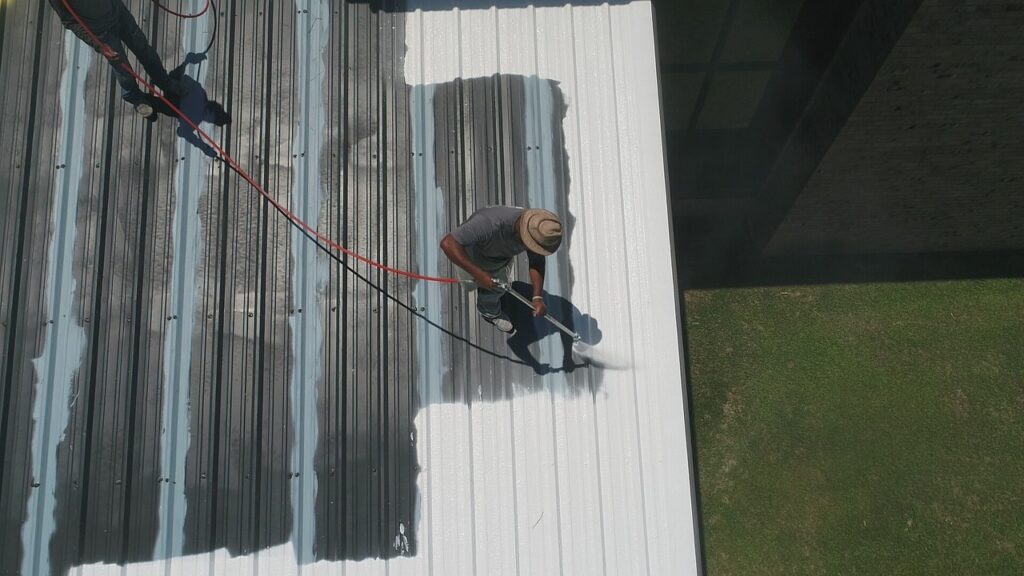
Roofing Contractors
These companies specialize in a range of commercial services, including installation, repair, maintenance, and inspection.
Contracting experts to the design, construction, and maintenance of roofs on commercial buildings such as office buildings, retail stores, industrial facilities, and other types of non-residential structures. These roofs are typically larger and more complex than residential roofs and are designed to accommodate the specific needs of the business that occupies the building.
Systems can be made from a variety of materials including asphalt, metal, and rubber, and can be installed using a variety of methods, such as flat roofing, sloped roofing, or built-up roofing. They must also be designed to meet local building codes and regulations, as well as any industry-specific requirements.
In addition to providing protection from the elements, you often need to accommodate various features such as HVAC equipment, access points, skylights, and more. The maintenance and repair of commercial roofs is also an important consideration, as regular inspections and repairs can help extend the life of the roof and prevent costly damage.
Types Of Roofs You Typically Find On A Commercial Building
There are several types of commercial roofs, each with its own unique set of features and benefits. Some of the most common types include:
Flat Roofs: Flat roofs are the most common type of commercial roof and are characterized by their flat or nearly flat surface. They can be made from a variety of materials, including asphalt, rubber, or metal, and are often used on buildings with large, open spaces. The lack of slope on flat roofs can make them more susceptible to water damage, so proper drainage and regular maintenance is important.
Built-Up Roofs (BUR): Built-up roofs, also known as BUR, consist of multiple layers of roofing materials that are applied on top of each other to create a durable and long-lasting roof. They are often made from asphalt and gravel or tar and gravel, and are a popular choice for commercial buildings due to their durability and fire resistance.
Modified Bitumen Roofs: Modified bitumen roofs are similar to built-up roofs, but are made from a single layer of modified bitumen material
that is rolled out and secured in place. This type of roof is known for its flexibility, durability, and resistance to punctures and tears, making it a popular choice for commercial buildings with flat or low-slope roofs.
Metal Roofs: Metal roofs are made from a variety of materials including steel, aluminum, and copper. They are known for their durability and resistance to weather and fire, making them a popular choice for industrial and commercial buildings. Metal roofs can be designed to mimic the look of other roofing materials, and are available in a variety of colors and finishes.
Single-Ply Membrane Roofs: Single-ply membrane roofs are made from a single layer of synthetic rubber or plastic material that is adhered to the roof deck. They are lightweight, easy to install, and can be customized to fit the specific needs of the building. Single-ply membrane roofs are available in a variety of colors and finishes and are known for their durability and resistance to punctures and tears.
Green Roofs: Green roofs, also known as vegetative roofs, are roofs that are covered with a layer of vegetation, such as grass, flowers, or shrubs. They provide a number of benefits, including insulation, energy savings, and improved air quality, and are becoming increasingly popular for commercial buildings looking to reduce their environmental footprint.
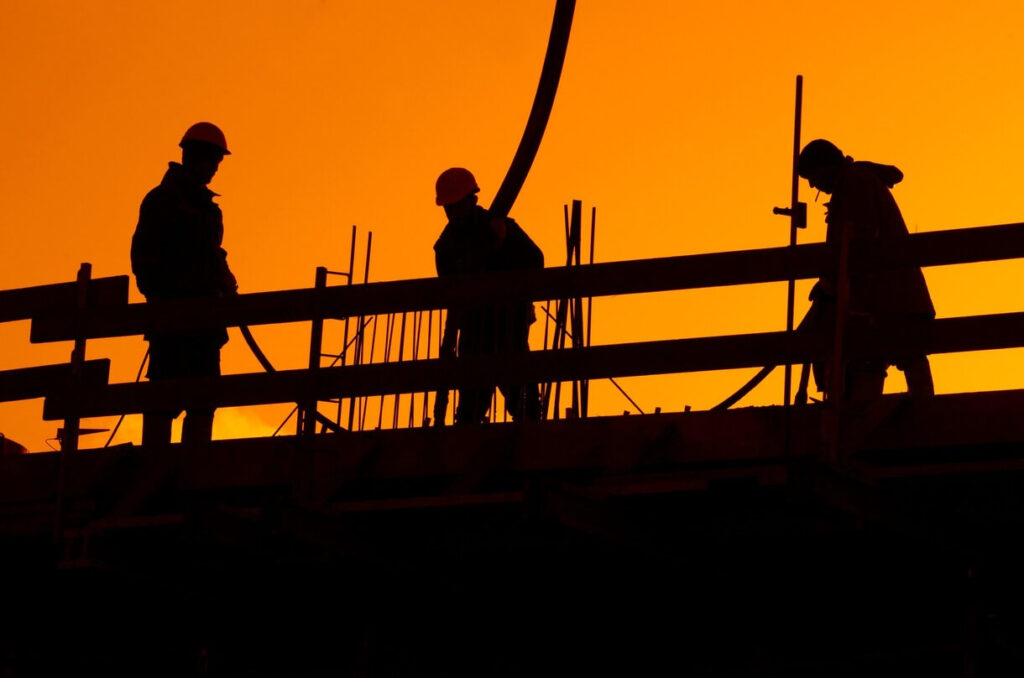
Hot Phoenix Climate Is A Challenge
Phoenix, Arizona has a hot and dry climate, which can present a number of challenge. Here are some of the common challenges that commercial roofs in Phoenix face:
High temperatures: The high temperatures in Phoenix can cause the roofing material to expand and contract, which can lead to cracking and other forms of damage. This is particularly true for flat or low-slope roofs, which can trap heat and increase the temperature of the roofing material.
UV exposure: The intense sunlight in Phoenix can cause the roofing material to fade, crack, and deteriorate over time. This is why it’s important to choose roofing materials that are specifically designed to resist UV exposure.
Water damage: Despite being a dry climate, Phoenix can experience heavy rain and flash floods, which can cause water damage to the roof if the roofing system is not properly installed or maintained.
Dust and debris: The hot and dry climate in Phoenix can result in the buildup of dust and debris on the roof, which can clog the gutters and downspouts and cause other types of damage if not removed.
Hail damage: Phoenix can also experience hailstorms, which can cause significant damage roofing material is not hail-resistant.
To overcome these challenges, it’s important to choose high-quality roofing materials that are specifically designed for the Phoenix climate and to have regular roof maintenance and inspections to keep the roof in good condition and protect the building from potential damage.
What types of commercial roofs are you most likely to have in Phoenix, AZ and why?
In Phoenix, Arizona, some of the most common types of commercial roofs are:
Single-ply membrane roofs: Single-ply membrane roofs, such as those made of TPO or PVC, are popular in Phoenix because they are lightweight, durable, and easy to install. They also offer good resistance to UV radiation and heat, making them well-suited to the harsh desert climate in Phoenix.
Built-up roofs: Built-up roofs, also known as tar and gravel roofs, are another popular choice in Phoenix. They are made of multiple layers of asphalt and roofing felt and are topped with a layer of gravel. They are relatively inexpensive and provide good protection against the sun and heat.
Metal roofs: Metal roofs are becoming increasingly popular in Phoenix due to their durability, energy efficiency, and low maintenance requirements. Metal roofs are also a good choice for areas prone to wildfires, as they are fire-resistant.
Modified bitumen roofs: Modified bitumen roofs are a hybrid of built-up roofs and single-ply membrane roofs. They are made of a layer of asphalt and a layer of polymer, and they offer good resistance to heat and UV radiation.
What services do commercial roofing companies provide?
Contractors provide a range of services to help maintain, repair, and replace commercial roofing systems. Some of the most common services include:
Roof Installation: install new roofing systems for new construction projects or for the replacement of existing roofs. They can work with a variety of roofing materials, including asphalt, rubber, metal, and more.
Roof Repair: provide repair services for roofs that have been damaged by storms, leaks, or other factors. This can include repairing or replacing damaged roofing materials, fixing leaks, and reinforcing weak spots in the roof.
Roof Maintenance: Regular roof maintenance is important to extend the life of a roof and prevent costly damage. Many companies can provide services such as cleaning and removing debris, inspecting the roof for damage, and making repairs as needed.
Roof Restoration: In some cases, it may be more cost-effective to restore an existing roof rather than replace it. Contractors can provide services such as recoating or resealing the roof, reinforcing the roof deck, and repairing any damage.
Roof Replacement: the end of its useful life, it may be necessary to replace it. Commercial roofers can provide services to remove the old roof, install a new roofing system, and repair any damage to the roof deck or structure.
Emergency Roofing Services: service companies can provide emergency services for roofs that have been damaged by storms, fires, or other factors. This can include tarping the roof to prevent further damage, making emergency repairs, and assessing the extent of the damage.
These are just some of the services that commercial roofers can provide. The specific services offered will vary depending on the roofer and the specific needs of the building. It’s important to choose a reputable and experienced contractor to ensure the quality and longevity of your roofing system.
Steps In Applying A Roof On a Commercial Building
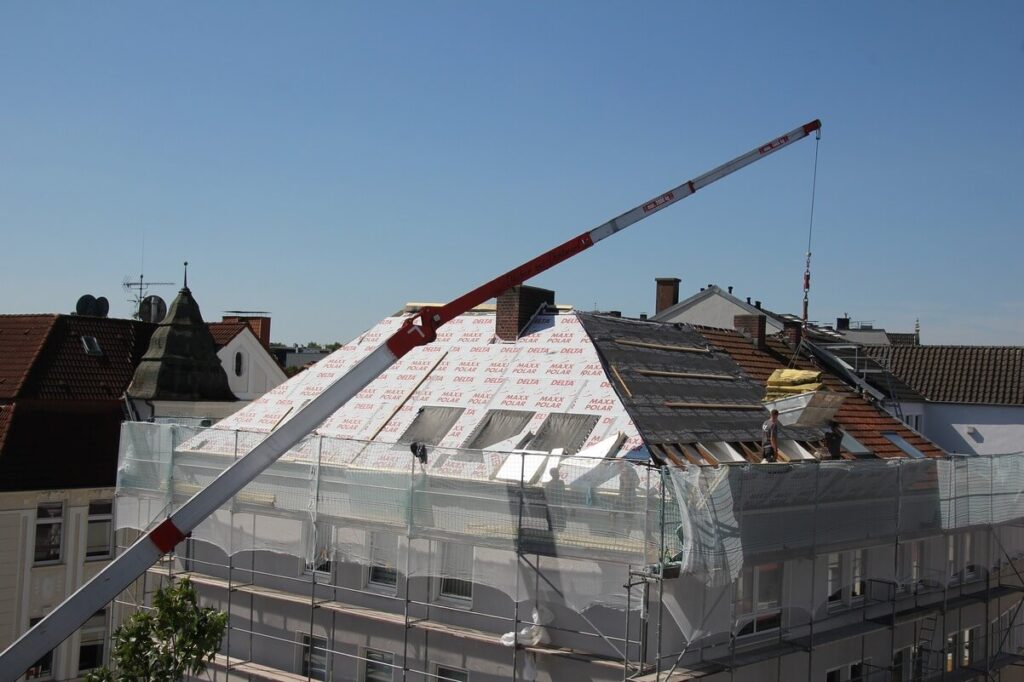
The steps involved in applying a roof on a commercial building can vary depending on the type of roofing material and the specific needs of the building, but generally, the process will involve the following steps:
Preparation: Before the roof can be installed, the roof deck must be prepared by removing any old roofing materials, repairing any damage to the deck, and ensuring that the deck is clean and level.
Design and Planning: The roofing contractor will work with the building owner to design the roofing system and create a plan for the installation process. This will include determining the type of roofing material, the slope and layout of the roof, and the location of any roof penetrations, such as vents and skylights.
Materials Delivery: The roofing materials, including the roofing membrane, flashings, and any other necessary components, will be delivered to the site.
Installation of Underlayment: A layer of underlayment, such as asphalt-saturated felt, will be installed over the roof deck to provide additional protection against water damage.
Installation of Roofing Membrane: The roofing membrane will be installed over the underlayment, either by rolling it out and securing it in place or by installing individual panels.
Flashing Installation: Flashings, such as around roof penetrations and at the edges of the roof, will be installed to ensure that water cannot penetrate the roofing system.
Final Inspections: The roofing contractor will perform final inspections of the roofing system to ensure that it has been installed correctly and that all necessary components are in place.
Cleanup: The roofing contractor will remove any debris and materials from the site and perform any necessary cleanup.
This is a general outline of the steps involved in installing a roof on a commercial building. The exact process may vary depending on the type of roofing material, the specific needs of the building, and other factors.
What is commercial roof maintenance?
Maintenance is the process of regularly inspecting and caring for a commercial roof to keep it in good condition and extend its lifespan. This involves a range of tasks, including:
Cleaning: Removing debris, leaves, and other materials from the roof can help prevent clogging of drains and gutters and protect the roof from water damage.
Inspecting: Regularly inspecting the roof for signs of damage, such as cracks, leaks, and missing or damaged shingles, can help identify problems early and prevent them from becoming bigger, more costly issues.
Repairing: Repairing any damage to the roof, such as fixing leaks or replacing damaged shingles, can help prevent water damage and extend the life of the roof.
Recoating: Applying a new coat of protective material to the roof can help prevent weather damage and extend the life of the roof.
Sealing: Sealing any cracks or gaps in the roof can help prevent water damage and improve the overall performance of the roof.
Commercial roof maintenance is important because it can help prevent expensive repairs, extend the life of the roof, and ensure that the roof continues to provide proper protection for the building and its occupants. It’s recommended to have a professional contractor perform regular maintenance to ensure that the roof is in good condition and functioning properly.
How long is the roof warranty?
The length of the warranty can vary depending on several factors, including the type of roofing material, the quality of the roofing system, and the manufacturer of the roofing materials.
Typically, warranties range from 5 to 20 years, with the most common length being 10 to 15 years. Some commercial roofing systems, such as metal roofs, may have warranties that last for 25 years or more.
It’s important to note that warranties for commercial roofs typically cover the cost of materials, but do not cover the cost of labor or other expenses related to the installation of the roof. It’s also common for warranties to
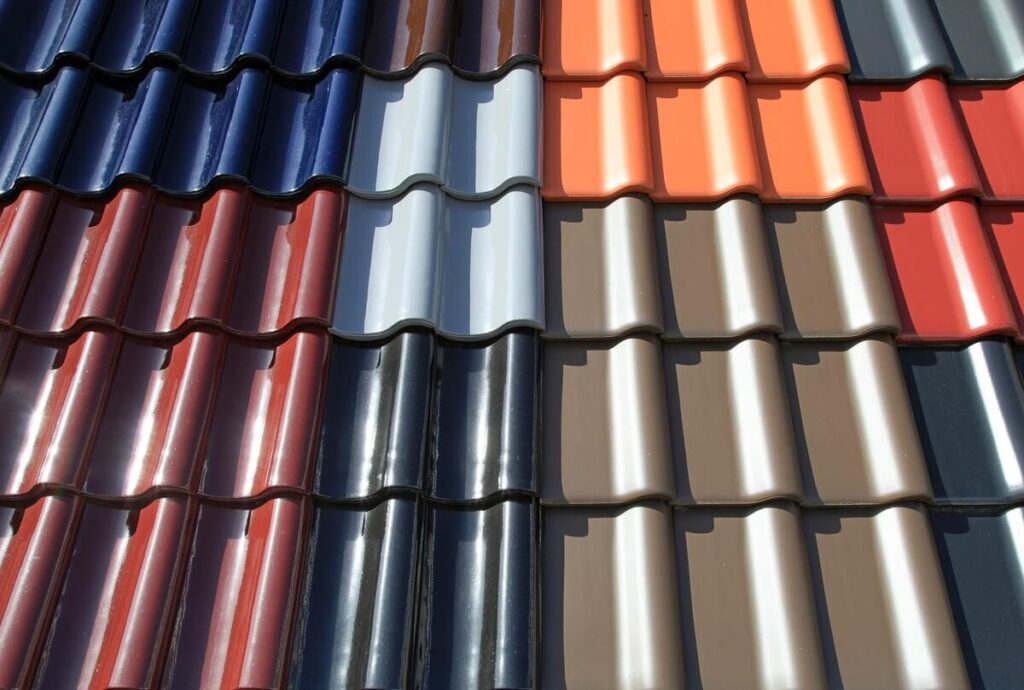
Steps For Checking The Condition Of A Roof.
Checking the condition is an important part of maintaining the overall health and safety of a building. Here are the steps to follow when checking the condition of a roof:
Conduct a visual inspection: The first step in checking the condition of a commercial roof is to conduct a visual inspection. This can be done from the ground, or by walking on the roof if it is safe to do so. Look for any obvious signs of damage, such as missing or damaged shingles, cracked or warped roofing material, and signs of water damage, such as discoloration or staining.
Check for leaks: Look for any signs of water infiltration, such as water stains on the ceiling or walls. Pay special attention to areas around roof penetrations, such as vents, chimneys, and skylights.
Check the flashing: The flashing is the metal or rubber material that seals the roof around roof penetrations and other areas where the roof meets the walls of the building. Check the flashing for any signs of damage or separation, as this can allow water to penetrate the roofing system.
Check the gutters and downspouts: The gutters and downspouts are part of the roofing system and play an important role in directing water away from the building. Check the gutters for any signs of damage, clogging, or separation, and make sure that the downspouts are properly directing water away from the building.
Check the roof deck: If it is safe to do so, check the roof deck for any signs of water damage, such as warping, rotting, or discoloration.
Check the insulation: The insulation in the roof helps to regulate the temperature inside the building and reduce energy costs. Check the insulation for any signs of damage or deterioration, and make sure that it is properly installed and in good condition.
Consult a professional: If you are not comfortable conducting a roof inspection yourself, or if you notice any signs of damage, it is recommended that you consult a professional roofing contractor. A professional roofer will be able to assess the condition of the roof, identify any potential problems, and provide recommendations for repairs or maintenance.
By following these steps, you can ensure that your commercial roof is in good condition and that your building is protected from water damage and other potential issues.
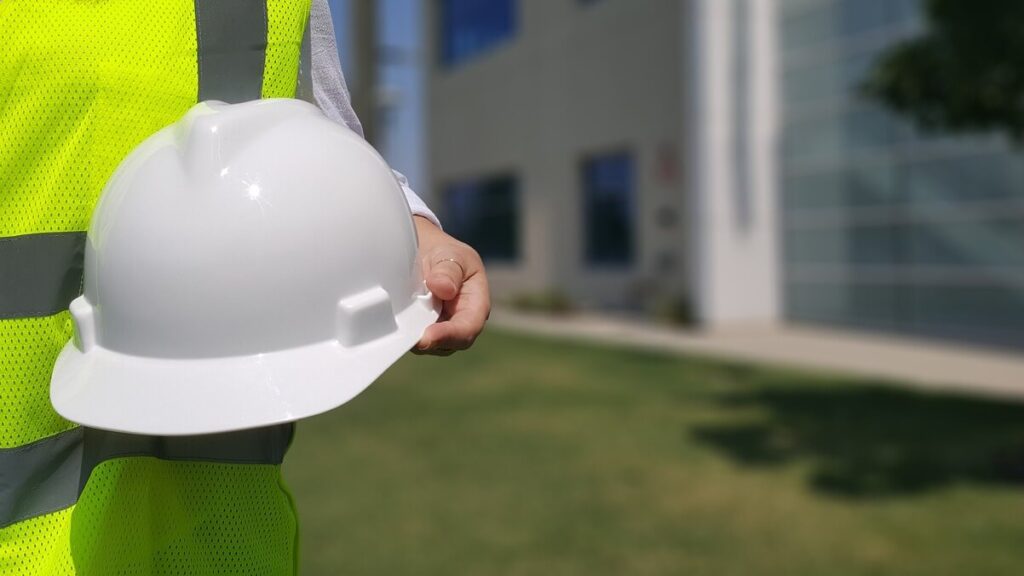
Fees For A Professional Inspection
Yes, most commercial roofing companies charge fees for roof inspections. The exact fee will vary depending on the company and the scope of the inspection. Factors that can affect the fee include the size of the roof, the complexity of the roofing system, and the level of detail that is required for the inspection report.
Typically, a basic roof inspection will cost several hundred dollars, while a more comprehensive inspection that includes a detailed report and recommendations for repairs or upgrades can cost several thousand dollars.
It’s important to note that a commercial roof inspection is a worthwhile investment, as it can help identify potential problems before they become major issues, as well as provide information about the condition of the roof and any recommended repairs or upgrades. This information can also be valuable when negotiating a lease or sale of the building
Why Is It Important For A Company To a Commercial Roofing Expert?
There are several reasons why it’s important for a company to call a commercial roofing expert for roofing services and maintenance. Some of the most important reasons include:
Expertise and experience: Contractors who are experts have the knowledge, expertise, and experience necessary to properly diagnose roofing problems, recommend effective solutions, and perform high-quality repairs and installations. This can help to ensure that the roofing system is in good condition and will last for many years.
Cost savings: By working with a commercial roofing expert, a company can avoid costly mistakes and mistakes that can arise from attempting to perform roofing work without the proper training and experience. This can help to minimize the overall cost of roofing maintenance and repairs and can help to ensure that the roofing system is functioning properly and efficiently.
Safety: Roofing work can be dangerous, especially for those without the proper training and equipment. By calling a commercial roofing expert, a company can ensure that the work is performed safely and without risk of injury to workers or others on the property.
Warranty protection: Many warranties require that roofing work be performed by a professional roofing contractor in order to remain valid. By working with a expert, a company can help to ensure that the warranty remains valid and that the roofing system is protected against defects or other problems.
Energy efficiency: experts can help to identify ways to improve the energy efficiency of the roofing system, which can result in lower energy bills and a more environmentally friendly building.
In short, calling a commercial roofing expert is important for a company because it can help to ensure that the roofing system is in good condition, functioning efficiently, and protected against potential problems, which can result in cost savings, improved safety, and better building performance.
These companies specialize in a range of commercial services, including installation, repair, maintenance, and inspection. They have the expertise and experience necessary to address the specific challenges that roofs in Phoenix face, such as high temperatures, UV exposure, and hailstorms. When choosing a commercial roofing company, it’s important to research each company’s reputation, experience, and services offered, as well as to get quotes from multiple companies to compare pricing and services.